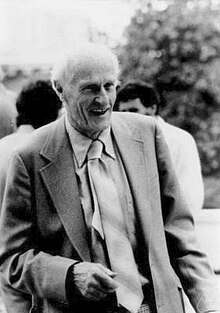Kleene
| Stephen Kleene | |
|---|---|
 |
|
| Born |
January 5, 1909 Hartford, Connecticut, US |
| Died | January 25, 1994 (aged 85) Madison, Wisconsin, US |
| Residence | United States |
| Nationality | American |
| Fields | Mathematics |
| Institutions | University of Wisconsin–Madison |
| Alma mater |
Amherst College Princeton University |
| Doctoral advisor | Alonzo Church |
| Doctoral students | John Addison Jr. Paul Axt Douglas Clarke Robert Constable David Kierstead Shih-Chao Liu Joan Moschovakis Yiannis Moschovakis Nels David Nelson Gene Rose Clifford Spector Richard Vesley Dick de Jongh |
| Notable awards |
Leroy P. Steele Prize (1983) National Medal of Science (1990) |
Stephen Cole Kleene /ˈkliːniː/ KLEE-nee (January 5, 1909 – January 25, 1994) was an American mathematician. One of the students of Alonzo Church, Kleene, along with Alan Turing, Emil Post, and others, is best known as a founder of the branch of mathematical logic known as recursion theory, which subsequently helped to provide the foundations of theoretical computer science. Kleene's work grounds the study of which functions are computable. A number of mathematical concepts are named after him: Kleene hierarchy, Kleene algebra, the Kleene star (Kleene closure), Kleene's recursion theorem and the Kleene fixpoint theorem. He also invented regular expressions, and made significant contributions to the foundations of mathematical intuitionism.
Although his last name is commonly pronounced /ˈkliːniː/ KLEE-nee or /ˈkliːn/ kleen, Kleene himself pronounced it /ˈkleɪniː/ KLAY-nee. His son, Ken Kleene, wrote: "As far as I am aware this pronunciation is incorrect in all known languages. I believe that this novel pronunciation was invented by my father."
...
Wikipedia
